Kenya: Is charity failing those who desperately need access to drinking water?
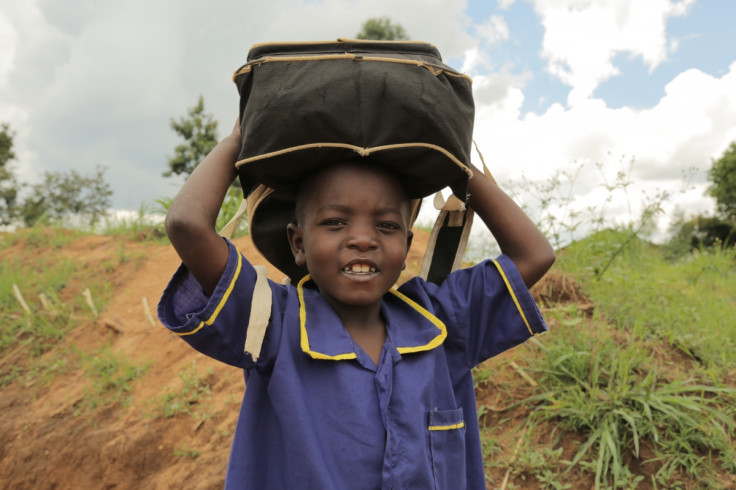
After 20 years working in global development across Africa, South America and Asia, humanitarian entrepreneur Mikkel Vestergaard says it is time for more private companies to support and drive programs in the development world. Vestergaard is CEO of his namesake company, Vestergaard, a global company he has structured around a humanitarian entrepreneurship business, and that launched the expansion of his Follow the Liters campaign in early November.
The programme, which began in October 2014, provides safe water in schools across Western Kenya. But, unlike a typical NGO programme, Vestergaard's initiative is based on consumer sales of its LifeStraw water purifier products in the West, rather than on donors.
"LifeStraw has been distributed in US for the past three years, and reached the European market a year ago. In 2014, we reached $12 million (£8m) in revenue on the US market alone, which is now paying for the 2015 Follow the Litres campaign," Vestergaard told IBTimes UK in Kakamega, Kenya's third largest city, on the evening of the launch.
In 2015, the humanitarian expects revenues will be above $20m.
"Maximum two years, and we will be reaching 1 million children, which is not an insignificant number for a development programme that is self-funded," he added.
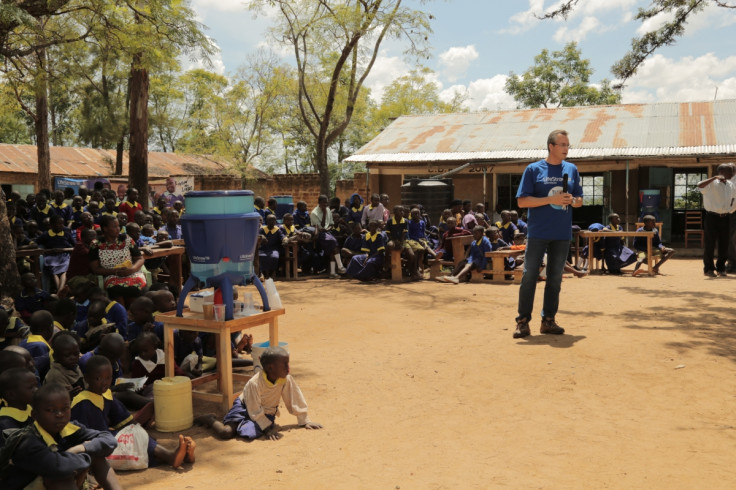
Vestergaard's grandfather Kaj Vestergaard Frandsen, a farmer, founded the company, a former uniform maker, in 1957, but the current CEO's humanitarian adventure started in 1991 when, as a rebellious young man, he packed a rucksack, hitch-hiked through Europe and ended in Egypt. A first encounter with the African continent, Vestergaard's time in Cairo was also professionally enriching.
"When I lived there, I ran into a lot of people from Nigeria and Saudi Arabia, who would get there to let loose. Sitting one night in a hotel, the Nigerians would tell me about this great business of selling second-hand cars. When you're 19 years old, business planning is not part of your core skill-set, and I started developing this idea about my life that I would like to make money while travelling around."
So, a young Vestergaard started selling Europe-bought car parts and truck engines in Nigeria before they went through customs, but his business was cut short when, in 1993, military ruler Ibrahim Babangida annulled the elections, triggering widespread acts of civil disobedience and killings.
Cash got tight for everyone and activity came to a standstill. "That's when I sold off whatever was there at whatever I could get for it," Vestergaard explained from the company's campaign unofficial general quarter, Kakamega's Golf Hotel.
When he returned to Denmark, his father, Torben, told him he wanted his son to manage his uniform maker company. Although the son accepted, he insisted he wanted to work with Africa.
"It got under my skin, it's hard to explain why, but I could see myself having a future working in such an environment, rather than selling shirts in Norway or Sweden."
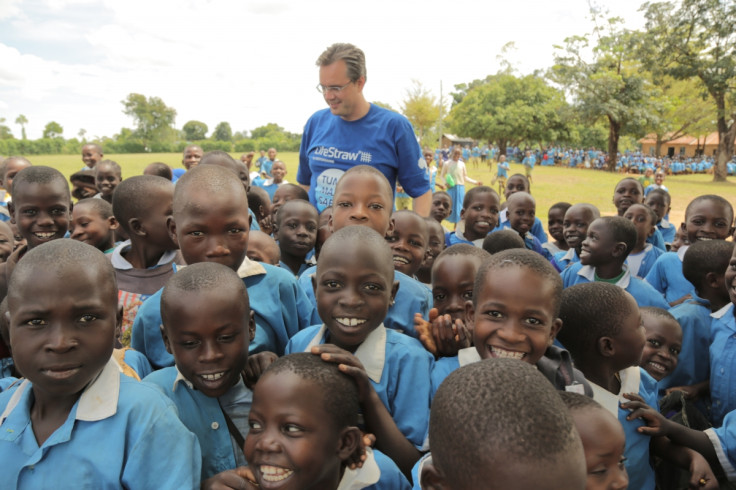
Revenue at the small-scale sewing business was $5m at the time, but the duo was able to set up a small business inside the family business that worked in Africa.
"It started by getting rid of some excess fabric, and soon it became providing tents and blankets for refugees in camps. It was very clear to me that, if you had to build a business where you also got money back from selling products, you may want to team up with NGOs and the United Nations. It became: 'Where does our textile fit if we work with UNICEF or the British Red Cross?'"
The restructuring of the company around a humanitarian entrepreneurship business model where "doing good is good business" coincided with the 1994 Rwandan genocide. By the end of the year, Vestergaard travelled to Nairobi, Kenya, which became a logistics hub for servicing conflict-ridden Rwanda, Burundi, Somalia, South Sudan and Northern Tanzania.
In January 1995, the company was incorporated. "As I started this business, within 18 months, it had grown larger than the rest of the family business," Vestergaard explained.
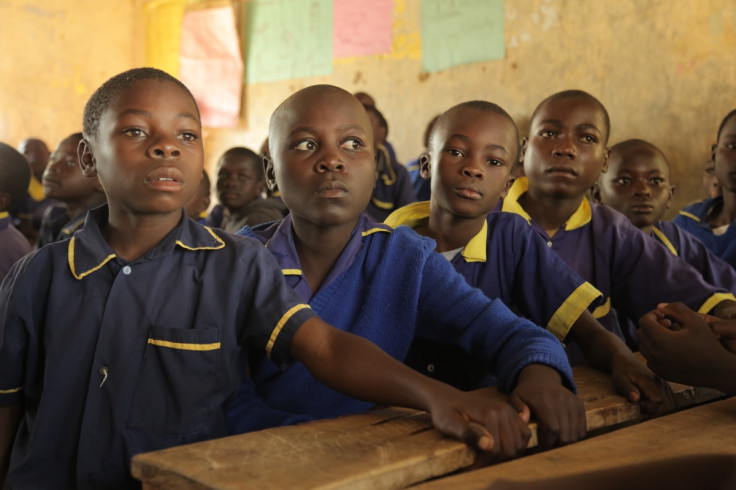
The young entrepreneur took over as Vestergaard's CEO in 1997. By the time he bought the business out in 1998, when he was just 25, the emergence of the internet forced Vestergaard to rethink its focus on temporary shelter − blankets, tents, plastic sheeting.
"It started hitting our industry when the Indians, Pakistanis, Chinese were able to, via the internet, distribute without a middleman like us. It was uninteresting to compete in a two-dimensional game."
With his back against the wall, Vestergaard strategically shifted the business away from concentrating on low-price logistics operations with the cheapest blankets to a model based on value-added textiles.
In came LifeStraw's Guinea Worm filters, tsetse fly traps and bed nets − global public health products that were championed by the likes of the World Health Organization (WHO) and The Carter Center, and which helped fight diseases, including malaria, HIV/Aids, diarrhoeal disease and neglected tropical diseases.
"This story shows how helpful the early days in our little textile operation were because we were able to use the expertise that we had gained. It suddenly became very valuable."

Through Vestergaard's advances in technology, the business was able to take malaria programmes to a whole new level. In association with the International Federation of the Red Cross, the UN Foundation and the CDC, the companies merged long-lasting insecticidal bed net distribution with integrated campaigns, such as measles vaccination, vitamin A and de-worming in Togo and Niger in 2004-2005. These developments coincided with the emergence of mega-donors.
In Kenya, the entrepreneur merged bed nets, water filters and HIV testing, which "each pay for each other".
Vestergaard explained: "Once you start using your bed net and your water filter, you delay the progression of HIV and delaying the need for getting expensive retroviral treatment more than pays for the upfront distribution of bed nets. It becomes a highly profitable intervention."
According to research published, it is estimated that if $100m was spent on an integrated campaign, like the CarePack campaign, the estimated savings could be as much as $400m.
In Western Kenya, Vestergaard has since opened the Emusanda health centre − which was equipped to help address the HIV epidemic that was sweeping across the area − and its current Follow the Litres campaign. In 2006, Forbes Magazine recognised Vestergaard's LifeStraw water filter as "One of 10 things that will change the way we live".
The tall sporty Dane was elevated to the status of hero in the region in 2009, when he became the only Mzungu ("white man") tribal elder in the whole 4.5 million people from the predominant Luhya tribe. Around Kakamega, Vestergaard is known as Omwami Mikkel − King Mikkel.
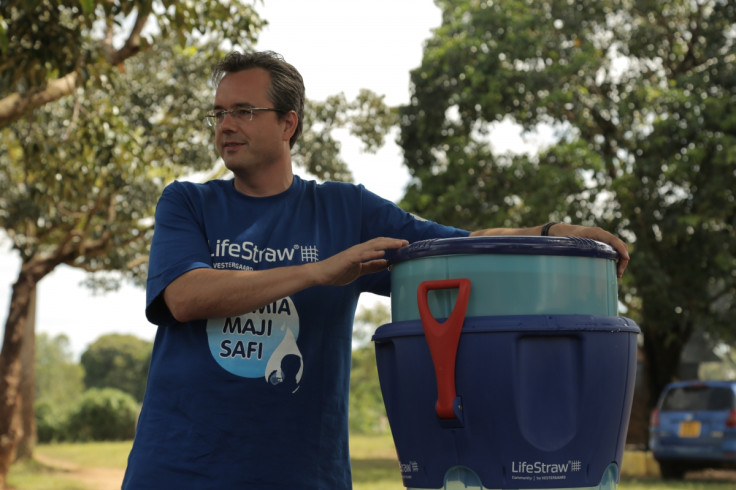
After 20 years spent trying to answer humanitarian issues on the continent, Vestergaard now talks about a sense of uneasiness about future of global development.
"If we continue doing what we're doing today, we are going to have a bit of a s**t show on our hands," he said, pointing to too few efforts to tackle the effects of climate change, such as mass migration.
"I don't think any government has the budget for the consequences of climate change. While we're debating putting a halt to the rise of temperatures, nobody is debating the cost of not doing it," he explained. "This is where companies have to play a big role."
"I think companies are missing the point when they think their consumers are going to go on with their daily life and not be concerned. I don't understand why companies aren't putting an offer to their clients that, in addition to the value of their product or service offers, you can help achieve the Sustainable Development Goals (SDGs) by wrapping them into the service or product. Improving the quality of life for everyone becomes part of every transaction."
Follow the Litres campaign is a very tangible example of this, he claimed, but says that this type of business model has to be widely accepted to be effective.
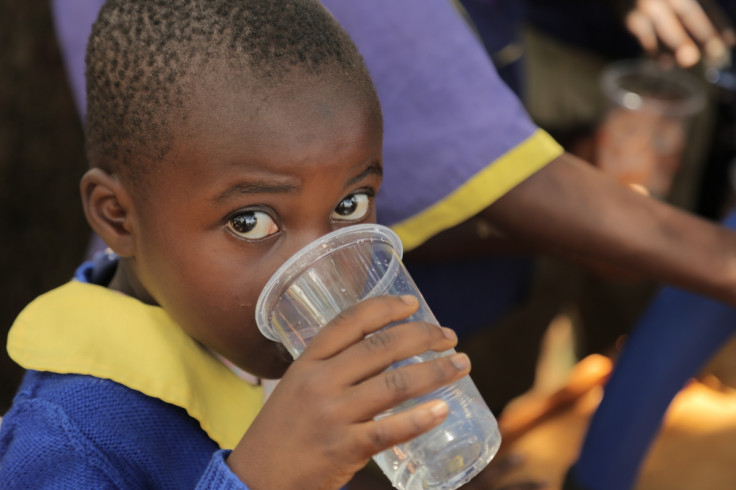
"For more than a decade, I have believed that global responsibility is not just something that takes place in the White House and 10 Downing Street, but in every boardroom, because every boardroom has the power to," the entrepreneur, who also acted as an advisor to the prime minister of his native Denmark, said.
"When the financial crisis happened in 2008, one of the first things that got cut in corporate budgets was CSR [corporate social responsibility], but the last things that got cut was R&D and branding, because those are your future."
Follow the Litres campaign is core, because it is tied to R&D and branding, two areas that Vestergaard would not cut, should the company face financial difficulties.
"If you end up collecting money, donating money to a village in Zambia, you build a borehole and tell the story in your cafeteria, and mesh on employee retention, that's good. But it's a one-off, and it's unsustainable."
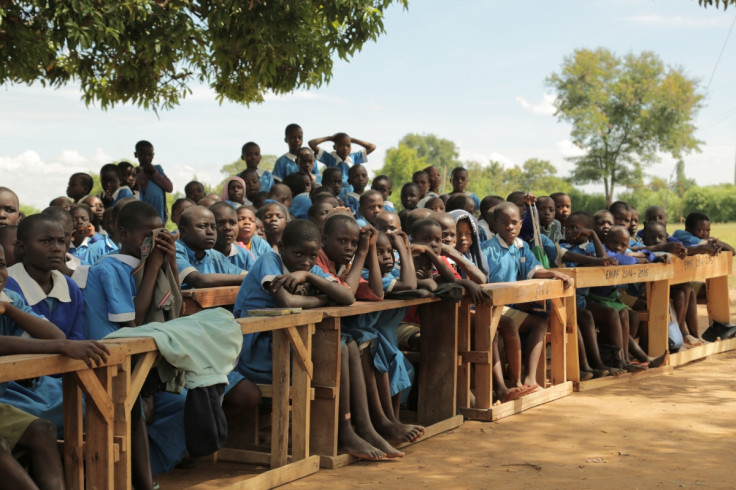
While the entrepreneur says campaigns to fight malaria or HIV have the consumers and donors hooked, he says engaging about water issues is more laborious.
"Water is more difficult because there hasn't been a lot of rock stars in diarrhoea. So the advocacy piece is somewhat broken. Developing the [anti-malaria] bed net technology was so easy and so simple that the technology triggered the change for people to rally around it. You haven't had that with water filters, and I cannot explain why. I find it unfathomable."
Approximately 88% of deaths due to diarrhoeal illness worldwide are attributable to unsafe water, and diarrhoeal diseases kill more children than Aids, malaria and measles combined. In 2015, these preventable illnesses are the second leading cause of death among children under five, according to the Centre Control and Prevention.
"But if we keep getting the markets right [in the West], and we keep growing our business, there's no end to how much we can get done here, in Africa. Reaching 361,000 children after just two years, that's a relatively good achievement for a water programme − making it probably one of the largest on the African continent."
Vestergaard, who received the 2009 Social and Economic Innovation Award from The Economist, is currently working on a number of innovations. These include new bed nets, which he says could help eradicate most of malaria cases linked to insecticide-resistant mosquitoes.
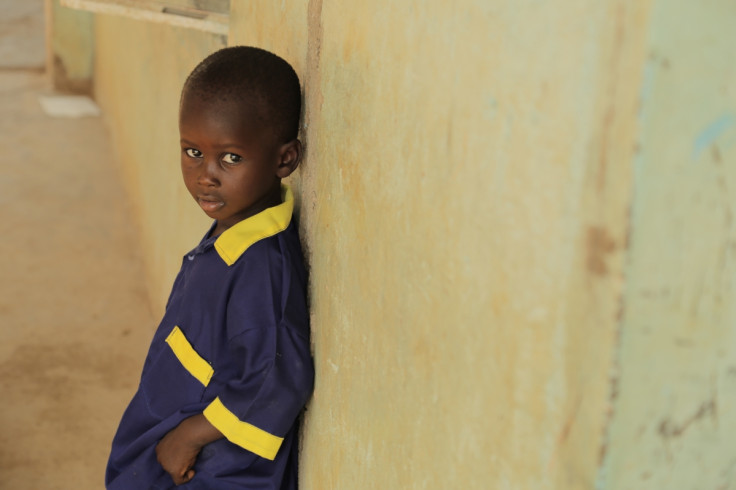
Elsa Buchanan travelled courtesy of Vestergaard.
© Copyright IBTimes 2025. All rights reserved.






















